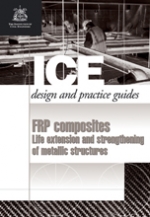Fibre reinforced polymer composites have been used for many years in the aircraft and shipbuilding industries. They are now being used in a variety of construction applications where their light weight, high strength, stiffness, durability, and ease of installation makes them cost-effective. This is particularly the case in the repair and rehabilitation of existing infrastructure.
This book provides design guidance in the use of fibre reinforced polymer composites, based on the results of two major programmes funded by the DETR. It demonstrates that fibre reinforced polymer composites can be used with confidence in structural applications. Likewise, guidance is given on short-term and long-term behaviour and how this can be interpreted in a design situation. Also included are case studies of projects on the London Underground network, alongside contributions from industry research groups.
FRP composites can offer a performance or cost benefit over traditional solutions. As there are no official standards for this type of work, this first attempt at producing design recommendations will be a vital resource for structural engineers.

























